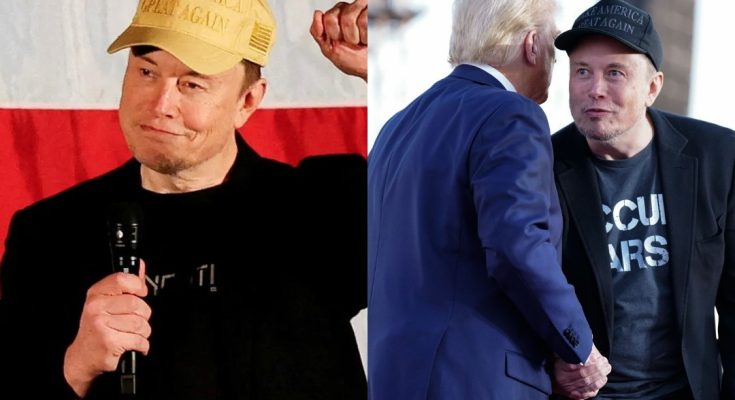The complaint, submitted to a federal court in Philadelphia on May 8, claims that Musk’s political action committee promised $100 payments to registered voters in exchange for signing a petition supporting constitutional values, only to renege on that promise following Trump’s victory. The three plaintiffs from Pennsylvania, Nevada, and Georgia contend that they were deprived of their anticipated compensation and are now pursuing justice not only for themselves but also for a potential class that could encompass hundreds or even thousands of others.
This lawsuit casts a negative light on Musk’s highly contentious involvement in the 2024 election, during which he reportedly invested around $300 million to facilitate a Republican win and actively campaigned for Donald Trump, who ultimately triumphed over Democratic candidate and Vice President Kamala Harris.
The America PAC, established by Musk to sway political outcomes under the pretense of advocating for First and Second Amendment rights, had pledged financial incentives to citizens willing to endorse its online petition.
Initially offering $47 per signer and subsequently raising that amount to $100, the campaign also introduced referral bonuses and, in its most attention-grabbing initiative, promised daily $1 million lottery giveaways to participants. The complaint states that these assurances fostered a contractual expectation that was ultimately unfulfilled.
Voters, particularly in crucial states such as Pennsylvania and Georgia, were motivated to sign up and refer others, under the impression that they would receive the promised compensation. However, the lawsuit claims that many, if not the majority, of those who participated did not receive any payments. The plaintiffs’ legal team, the law firm Lichten & Liss-Riordan, estimates that the number of individuals who have not been compensated may exceed 100, with total unpaid compensation potentially exceeding $5,000,000.
‘This case revolves around a broken promise,’ stated firm co-founder Shannon Liss-Riordan. ‘Our clients placed their trust in Elon Musk and acted based on that trust. However, the promise was not fulfilled.’ The ramifications of this lawsuit reach far beyond the issue of payment. Legal experts are now expressing concerns regarding potential violations of federal election laws. Critics contend that Musk’s PAC effectively established a pay-for-participation model in critical states, blurring the distinction between incentivized civic engagement and possible voter manipulation.
Providing direct monetary incentives for political engagement, even when presented as support for constitutional values, may attract scrutiny from the Department of Justice and the Federal Election Commission, which oversee election practices and campaign finance laws.
Watchdog organizations are particularly concerned about the operations of the America PAC regarding its so-called civic initiatives. The abrupt increase in payment from $47 to $100 just weeks before the election, the introduction of lottery-style million-dollar prizes, and the emphasis on swing states all indicate a deliberate attempt to galvanize voters in alignment with Musk’s political objectives under potentially dubious ethical and legal circumstances.
Although the PAC asserts that its campaign is centered on ‘freedom of speech’ and ‘American values,’ critics argue that the timing and design of the rewards raise concerns about voter manipulation. Compounding the situation, Musk has not publicly addressed the lawsuit, nor has his America PAC.
In earlier statements, the PAC claimed to have already distributed ‘tens of millions of dollars’ to canvassers and petition signers, suggesting that the payment issue was minor or isolated. Nevertheless, the increasing legal challenges present a contrasting narrative, as a separate class action lawsuit is currently in progress, claiming that the $1 million daily lottery was, in fact, fraudulent.
The wider political landscape is observing with great interest. Democrats have capitalized on the lawsuit to call for investigations and legislative changes aimed at preventing what they describe as ‘manipulation of democracy by tech billionaires.’ Republicans, on the other hand, have adopted a more cautious stance, largely avoiding public defense of Musk due to concerns over potential repercussions if the legal disputes escalate.
Civil rights organizations, particularly those advocating for voter integrity, contend that Musk’s actions—especially the proposal of direct financial incentives for election-related activities—could establish a perilous precedent that erodes trust in the democratic system. With the 2026 midterm elections approaching, the resolution of this case may influence the financing of future campaigns and the extent to which private interests can engage in voter mobilization.
Fundamentally, the lawsuit poses critical inquiries regarding the commercialization of political engagement. Is it permissible for a billionaire to offer monetary compensation in exchange for signatures and have it regarded solely as an exercise of free speech? Or does such an action equate to the acquisition of influence on a national level? For Elon Musk, who has consistently portrayed himself as a visionary transcending political boundaries, this juncture could represent a pivotal moment. The class action lawsuit may extend beyond mere broken commitments—it may question whether the wealthiest individual in America has overstepped in his efforts to reshape the political arena.

